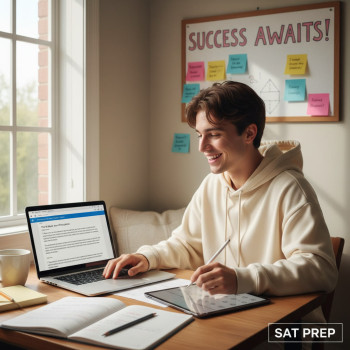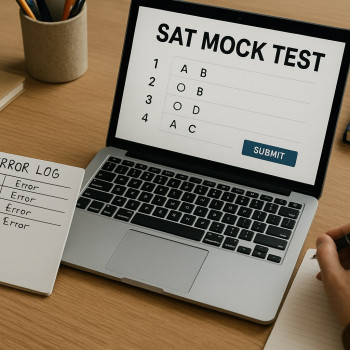Why This Topic Matters
Preparing for the SAT can feel like training for a marathon most students weren t warned about. Long evenings with practice tests, the pressure to maintain grades, college lists, and a hundred little decisions about when to study and what to skip all stack up. Burnout creeps in slowly and, if ignored, can undo months of progress. This post walks through why students burn out during SAT prep, how to notice the early signs, and practical, human-centered strategies to stay steady and productive.
What I mean by “burnout”
Burnout is more than feeling tired the night after a practice test. It s a chronic state of mental and physical exhaustion that makes it hard to focus, learn, or feel motivated. For SAT students, burnout often shows up as stalled score improvement, avoidance of study tasks, and growing anxiety about test day.
Why Students Burn Out During SAT Prep
There are several overlapping reasons that turn good intentions into exhaustion. Understanding the root causes helps you pick the right fixes instead of piling on more willpower.
1. The marathon vs sprint mismatch
Many students treat SAT prep like a sprint: cram vocabulary overnight, take a bunch of practice tests in a row, or try to grind for hours without breaks. The brain doesn t work that way. Building skills for reading comprehension and math reasoning is cumulative and benefits from spaced, varied practice. Sprinting feels productive for a day, then drops performance and morale.
2. Unrealistic expectations and perfectionism
It s normal to want a high score, but setting unrealistic goals or expecting flawless practice sessions increases stress. Perfectionism turns mistakes into proof of failure rather than opportunities to learn, increasing avoidance and dread.
3. Overreliance on passive studying
Highlighting a book or watching video lessons for hours creates the illusion of progress without strengthening the skills you need on test day. Passive approaches are cognitively cheaper but lead to rapid boredom and weak retention.
4. Unbalanced life and poor recovery
Sleep, nutrition, exercise, and social connection are not optional extras. They are essential supports for concentration and memory. Students who cut sleep or social time for prep create a deficit that compounds over weeks.
5. Test anxiety and fear of failure
Anxiety amplifies cognitive load. Worry uses the same working memory resources you need for complex reading and problem solving. When anxious students study under pressure, they often remember less and generalize that failure to all future efforts.
6. Lack of structure or bad planning
Without a clear, tailored plan, study sessions become reactive and inefficient: practice the topics you enjoy and avoid the ones you don t. Lack of feedback and direction makes it hard to measure progress and stay motivated.
Signs You Might Be Burning Out
Early recognition lets you course-correct. These are common warning signs to watch for, with brief suggestions for what to do next.
| Symptom | What it looks like | Immediate fix |
|---|---|---|
| Chronic fatigue | Always tired, dragging through study sessions | Prioritize sleep; short naps and consistent bedtime |
| Procrastination | Putting off practice tests or writing sections | Break tasks into 25-minute blocks; use accountability |
| Emotional reactivity | Feeling unusually frustrated or hopeless | Talk to someone; brief mindfulness or walk |
| Falling scores | Practice tests stagnate or drop | Switch to targeted practice and review mistakes |
| Loss of interest | Study feels purposeless | Revisit goals; mix in engaging practice formats |
Real-World Example: Maya s Story
Maya was scoring 1150 and wanted a 1400. She signed up for a dozen weekend classes, did six-hour study days, and took three full-length tests back-to-back. For two weeks she felt like she was making progress, then hit a wall. Scores plateaued and she stopped finishing sections. Anxiety spiked and she began to skip practice altogether.
Instead of more hours, Maya switched to a targeted plan: two 50-minute focused study sessions on weak topics, one full practice test each week, and weekly check-ins with a tutor for feedback and adjustments. She added morning walks and regular sleep. Over two months her score improved steadily and burnout vanished. The difference? Direction, recovery, and focused practice instead of volume alone.
Strategies That Work: Preventing and Recovering from Burnout
Below are practical, evidence-informed strategies you can start using right away. You don t need to adopt them all at once; small changes compound.
1. Build a tailored, realistic plan
Generic plans push the same checklist on everyone. A tailored plan matches your baseline skill level, target score, and life schedule. That s where 1-on-1 tutoring can be a game-changer: an expert tutor helps you identify which question types lose you points and crafts a study plan you will actually follow. Sparkl s personalized tutoring offers this kind of tailored guidance, combining expert tutors with AI-driven insights so your plan adapts as you improve.
2. Prioritize spaced, active practice
Spaced repetition and active recall beat massed practice. Instead of three hours of passive reviewing, try short, spaced sessions that require you to retrieve answers and explain reasoning out loud. Active techniques include:
- Practice problems with immediate self-explanation
- Flashcards with spaced intervals
- Teaching a concept to a peer or tutor
3. Use the Pomodoro technique and intentional breaks
25- or 50-minute focused blocks followed by short breaks keep attention sharp. During breaks, move, hydrate, or look away from screens. Breaks are where the brain consolidates learning; skipping them is false economy.
4. Measure progress with the right metrics
Instead of hours logged, track accuracy by question type, timing per question, and error patterns. If your timing is off in the Reading section, practice pacing rather than adding vocabulary lists. Personalized tutoring and AI-driven analytics can speed up this diagnosis and give clearer next steps.
5. Make recovery non-negotiable
Schedule sleep, exercise, and social time like you schedule study. Recovery boosts memory and reduces vulnerability to burnout. Even short, consistent habits matter more than occasional long ones.
6. Practice mindful prep to manage anxiety
Mindfulness and brief breathing exercises reduce the intrusive thoughts that eat working memory. Spend five minutes before a practice test to steady your breath and set a simple focus: “Do one thing at a time.”
7. Vary study modes to maintain interest
Switch between practice tests, targeted problem sets, timed sections, group discussion, and tutor reviews. Variety prevents tedium and reinforces learning from multiple angles.
Sample Weekly Plan: To Prevent Burnout
This example assumes about 10-12 hours per week of deliberate SAT prep spread across six days. Adjust timings for your life and test date.
| Day | Morning | Afternoon/Evening | Notes |
|---|---|---|---|
| Monday | 30-minute review flashcards | 50-minute targeted math practice | Short walk in evening |
| Tuesday | Timed Reading section practice (50 min) | Review errors with explanation (40 min) | Light stretching before bed |
| Wednesday | Grammar drills (40 min) | Rest or social time | Active recovery day |
| Thursday | 50-minute math concepts drill | Tutor session or study group (60 min) | Homework: write quick explanation of weak concept |
| Friday | Light review flashcards (20 min) | Practice test section under timed conditions | Plan weekend practice |
| Saturday | Full-length practice test (with breaks) | Review mistakes and plan next week (90 min) | Longer recovery activities |
| Sunday | Rest or light review | Family time and sleep | Recharge |
The Science of Short Practice and Big Gains
Two simple scientific principles explain why less can be more.
Spacing effect
Repeated exposure over time builds durable memory. Cramming gives quick gains but fragile retention. Small, spaced sessions create durable understanding you can retrieve under test pressure.
Desirable difficulty
Tasks that feel slightly hard during practice (timed sections, mixed problem sets) lead to stronger learning. The discomfort is intentional and temporary; it signals cognitive work that strengthens memory.
How Tutors Help Avoid Burnout
Coaching reduces wasted effort. Tutors not only teach content, they:
- Diagnose patterns in mistakes
- Create learning cycles and pacing that match your life
- Provide accountability and emotional support
When burnout comes from unfocused effort, a skilled tutor rewrites your plan to preserve energy and accelerate progress. Sparkl s model mixes expert human tutors with AI-driven insights to spot trends faster and personalize study plans that evolve as you improve. That combination helps students avoid the trap of doing more of what isn t working.
Nutrition, Sleep, and Movement: The Unsung Heroes
Simple physiological habits amplify everything else. Consider these practical, low-friction changes:
- Sleep: target consistent bed and wake times, 7.5-9 hours when possible
- Hydration: drink water throughout the day; dehydration reduces cognitive speed
- Protein and complex carbs: steady energy beats sugar spikes
- Movement: 20-minute walks or short workouts sharpen attention
When to Step Back Entirely
Sometimes the best strategy is to pause. If you find your mood dipping, relationships fraying, or schoolwork suffering, talk with a counselor, tutor, or family member and consider a short break. A week of rest can restore perspective and improve performance more than a month of grinding.
Quick Tools You Can Use Tonight
- Set a consistent bedtime and a 30-minute wind-down routine
- Do a single timed section with a clear goal: accuracy or pacing
- Write down three small, specific wins from today s study
- Schedule one recovery activity for the weekend now
Final Thoughts: Keep the Test in Perspective
The SAT matters, but it s one measure among many. Treat prep like training, not punishment. You make the biggest gains when study is strategic, feedback-driven, and balanced with recovery. If you feel overwhelmed, try small changes first: re-balance your week, prioritize sleep, and focus on active practice. If you need more targeted help, 1-on-1 guidance can accelerate progress and reduce wasted effort. Services that deliver tailored study plans, expert tutors, and smart analytics like Sparkl s personalized tutoring model can make prep smarter and kinder to your energy.
Burnout is not a moral failing. It s a sign that your system needs a different input: better structure, smarter practice, and more recovery. With a plan that respects how you learn and live, SAT prep becomes a controlled, sustainable process that both protects your well-being and raises your score.


Quick checklist before your next study session
- Sleep: Did I get enough rest last night?
- Plan: Do I have one specific goal for this session?
- Format: Will I use active recall or passive review?
- Recovery: Is there a short break scheduled after this block?
- Support: Do I have at least one place to get feedback this week?
If you re stuck
Ask someone to help you diagnose the pattern. A quick tutor session can identify one or two small, high-leverage changes that remove weeks of frustration. The right guidance keeps momentum steady and makes prep feel less lonely.
Good luck. Breathe. Small, consistent steps win the long game.
















No Comments
Leave a comment Cancel